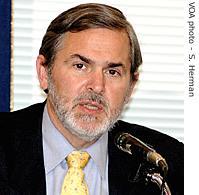2007年VOA标准英语-US Lawmakers Urge Action by Musharraf Against E
搜索关注在线英语听力室公众号:tingroom,领取免费英语资料大礼包。
(单词翻译)
By Dan RobinsonCapitol Hill
12 July 2007
U.S. lawmakers have told a senior State Department official that Pakistan's President Pervez Musharraf must act to eliminate Taleban, al-Qaida forces and extremists in his country. VOA's Dan Robinson reports on a congressional hearing on Capitol Hill.
| Pakistani President Pervez Musharraf addresses the nation on radio and Pakistan State Television in Islamabad, 12 Jul 2007, after the raid on Red Mosque |
During questioning of Richard Boucher, U.S. Assistant Secretary of State for South and Central Asia, members of the House Subcommittee on National Security and Foreign Affairs wanted to know what has come of U.S. pressure on President Musharraf.
The tone was reflected in this comment by Jim Cooper, a Democrat2 from Tennessee:
"I ask myself, is there anything else they could do to harbor an international bad guy? And yet they are still listed as a strong ally of our country and we are still giving them extraordinary amounts of aid, both military and domestic," said Jim Cooper.
 |
| Richard Boucher (file photo) |
He answered this way when asked by several lawmakers why, as the latest U.S. intelligence reports indicate, the tribal3 region of Waziristan, near the Afghan border, remains4 a haven5 for al-Qaida and Taleban elements, despite promises by Pakistan to oust6 militants7 based there.
"The agreements in Waziristan didn't work, there was an influx8 of al-Qaida, they found more freedom of movement when the checkpoints were removed, and they have been able to reorganize themselves to some extent in that area, and that is a current threat and that is an important threat to all of us, to Pakistan, Afghanistan and to our homeland and we will need to deal with it, and we need to deal with it [by] working [with] the Pakistanis," said Richard Boucher.
That comment echoed the assessment9 of intelligence officials who testified before Congress the previous day.
John Kringen, director of intelligence at the CIA, and Robert Cardillo of the Defense10 Intelligence Agency appeared before a House committee:
KRINGEN: "The peace deal in Waziristan has not been helpful in terms of the anti-terrorist effort."
CARDILLO: "We would agree that there are conditions that have come on the backside of that agreement that have made it more difficult for us to achieve objectives."
Despite a speech by President Musharraf's Thursday in which he pledged an all-out fight against extremists in Pakistan, Democrats11 and Republicans continue to question his commitment.
John Tierney is chairman of the committee. He began by talking about the Pakistan's government siege of a radical12 mosque in Islamabad. Government forces finally ousted13 the radicals14 from the mosque on Wednesday:
"The Red Mosque is merely a stark15 symbol of a deeper, more pervasive16 problem in Pakistan where there are far more jihadists, extremists madrassas, al-Qaida operatives, Taleban safe-havens, and international terrorist training camps than Pakistani government officials are willing to admit," said John Tierney.
Republican Christopher Shays questions the determination of President Musharraf in the fight against terrorists:
"President Musharraf may be turning a blind eye towards [ignoring] the growing ranks of Taleban and al-Qaida in Pakistan, lacking the ability or will to crack down on terrorist training camps in western Pakistan, and stopping the infiltration17 of jihadists moving across the Pakistan-Afghanistan border, and attacks on coalition18 forces and Afghan civilians," said Congressman19 Shays.
In his testimony20, Richard Boucher said the U.S. remains confident that President Musharraf will continue, in his words and his actions, to fight the al-Qaida presence in Pakistan.
In his address Thursday, President Musharraf announced stepped-up military operations along his country's border with Afghanistan, saying he is determined21 to root out "extremism and terrorism" throughout the country.




